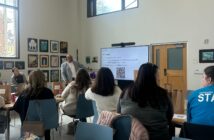
Leidy Mary
Just like a disease, technological advancements started out small. A boxy computer here, a thinner television there. Then the flu started to spread. Suddenly everyone had a cellphone.
If there was a graph representing the growth of technology, it would be exponentially curved upward, and we would be the dot right at the start of the curve, moments away from an industrial explosion that will send the line skyrocketing vertically.
Scientists around the world have already created robots that can perform simple and complex tasks. The Moley Robotic kitchen is a pair of arms that can cook meals and learn new recipes. You’ve probably heard of Sofia, the talking human-like robot that has citizenship in Saudi Arabia.
Tesla has self driving cars and Lyft is on its way to driverless vehicles. Even more shocking, Uber plans to get their wheels in the air by 2023. Countries like China and Germany also have prototypes for flying taxis to zoom customers to their desired locations quicker.
Just last week I saw a robotic cat on the shelf of CVS, advertised as a faithful companion to a lonely elder — an example of artificial intelligence taking the place of social interaction.
The coming times will shake the very ground on which we stand. Even learning at Lehigh will be profoundly different. Imagine walking into class and smiling at a collection of wires that you call “professor.”
There are two extreme theories. One is that AI will enhance our world to make us super humans. It could be a boon to society, expanding the things we are capable of and amplifying our skills. Though this leaves out the possibility that we could become idle sloths reliant upon robots to do even the simplest tasks such as brush our teeth for us, like in the movie WALL-E.
The other possibility is that their intelligence might surge above humanity’s, making them the superior species and creating a reality like Karel Čapek’s “Rossum’s Universal Robots.”
In order for AI to become human, it has to have four things: memory, rational thinking, learning and consciousness.
The robotic hand that continued to solve the Rubik’s Cube faster each time is proof that AI is capable of learning and memory.
In 2017, Google did a test with its DeepMind AI company on a computer game that asks players to gather as many apples as possible. The two AI agents in the game were calm until there were fewer apples left and they turned aggressive, using laser beams to attack each other.
Consciousness would be the biggest hurdle for the evolution of AI. Robots are unforgiving. Punch one by accident and it will simply learn to punch back. It does not love or empathize with others.
A robot only has rational thoughts that are framed around percentages and probabilities. If you had to choose to save the life of your mother or a man who knew how to cure cancer, you would likely choose your mother. The robot on the other hand would not hesitate to save the man, therefore saving millions of future lives in the process.
On a lighter note, I was born in 1999, among one of the last generations that didn’t grow up entirely reliant on technology.
My family didn’t have cable TV. I remember learning how to use YouTube for the first time, and the simple fact that I could search up any video in the world shattered my mind. I can still picture my dad’s green floppy disk in my hands. Most of my days were spent getting dirt under my nails while catching lizards with my friends.
I forget those moments. If I didn’t actively reach for those memories I might forget they ever existed at all.
Now kids grow up indoors, their fingers curling around the edges of a screen at the age of three. Friends hangout by ignoring each other in the same room. As Sherry Turkle put it, we have become experts at being “alone together.”
Even if robots don’t seek to enslave or eradicate us, there are other side effects to the proliferating advancement of technology on our species. We have begun to lose ourselves while trying to be connected.
Do you reach for your phone after finishing talking to someone? Do you scroll through Instagram instead of gazing at the sunset? Technology has not only taught us to fear solitude, but it has disconnected us from nature. Richard Louv talks about this idea in his book, “Last Child in the Woods: Saving Our Children From Nature-Deficit Disorder.”
Don’t get me wrong, the things that we have been able to create are astounding, and the future, a world that we would not be able to recognize, could be here as soon as 2030.
Just like an infection, AI will continue to spread. I just hope we don’t forget to make a cure.






Comment policy
Comments posted to The Brown and White website are reviewed by a moderator before being approved. Incendiary speech or harassing language, including comments targeted at individuals, may be deemed unacceptable and not published. Spam and other soliciting will also be declined.
The Brown and White also reserves the right to not publish entirely anonymous comments.